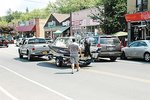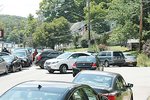Editor's Note: This is the second part of a story that began in the Friday, August 28 edition.
WOODBOURNE — Fallsburg Police Chief Simmie Williams doesn't yet have traffic or accident figures …
This item is available in full to subscribers.
Please log in to continue |


Editor's Note: This is the second part of a story that began in the Friday, August 28 edition.
WOODBOURNE — Fallsburg Police Chief Simmie Williams doesn't yet have traffic or accident figures for 2015, but he said the answer to Woodbourne's traffic concerns is already clear to him:
“We need parking some place. There is no more parking in Woodbourne.”
A walk along Main Street reveals about two dozen streetside spaces, plus room for approximately 70 cars in three lots and Marie's Park along the nearby Neversink River. None of the spaces (some of which are unpaved) are marked with striping.
Woodbourne resident Michael Eidel feels there should be more no-parking zones, especially in the narrower road shoulders. But Williams believes more parking spots would lessen the frequent stops by vehicles in the middle of the road to load/unload people and packages.
In the meantime, the chief has assigned three officers - on foot and bike - to Woodbourne each weekend since May.
“I hired a special traffic officer for Woodbourne just for the summer,” he says.
Even then, however, overtime is racking up, according to Williams.
He's heard the complaints from Sherry and Michael Eidel and says 7-8 officers - nearly half of his 18-member department - are involved in traffic patrol in some manner.
“I don't know what else I can do,” he explains. “I'll take any ideas.”
Especially since more development is on the horizon for Fallsburg.
“There are some building projects out there that are going to add more traffic - and then what are we going to do?” he wonders.
More officers aren't the answer, he insists, noting that “New York City has over 40,000 police officers - and there's still traffic.”
The comparison may be apt in another way. Many of those seeking out Woodbourne hail from New York City, where double- and triple-parking, U-turns and quick stops to load/offload are not only routine but necessary, due to the lack of parking and the hapdashery of city traffic.
“We come from Brooklyn, so we're used to the traffic,” Catskills Hatzalah Coordinator Bernie Gips notes, speaking of the ambulance service he helps run both upstate and downstate.
Gips considers Woodbourne “a little congested” on weekends but explains that doesn't interfere with his company's emergency operations.
“During the week, it's never an issue,” he adds, finding visitors and locals alike to be polite. “... We thank everybody for their courtesy.”
An old problem
Legislator Gene Benson, who toured Woodbourne on a recent Sunday with the Eidels and Town of Fallsburg Supervisor Steve Vegliante, says the issue isn't actually a new one, dating back to the heyday of the Borscht Belt.
“We used to work nights in the summertime,” he recalls of his former public works job with the town, “and we couldn't get through town if there was an emergency.”
These days, said Sherry Eidel, the town avoids sending work crews into Woodbourne on Fridays due to the traffic.
The town's traffic engineering firm and NYSDOT are setting out on an exploration of just what can be done - possibly from painting an additional crosswalk to increasing parking to adding a turning lane to altering the timing of the traffic lights that bookend Woodbourne.
Vegliante, however, reminds that this isn't a year-round issue.
“The reality is, it's 16 days a year,” he points out, referring to Fridays and Sundays in an eight-week period.
Two of those Sundays (coinciding with local camp visiting days) are particularly difficult, he acknowledges, but he doesn't believe visitors flock to Woodbourne to flaunt traffic laws.
“The majority of people want to do the right thing,” the supervisor says. “A small percentage don't.”
Sherry Eidel thinks there's a need for some drivers to be taught more respect for the rules of the road, but in the meantime, she is grateful for the town and state's attention.
“When something gets improved,” she says, “I'm the first one to say thank you.”
Still, she'll be closely watching how they proceed.
“I think a lot of the complaining over the years has made a difference,” she acknowledges, “but not to the point I'm comfortable with.”
That's why she considers it her civic duty to speak up.
“Don't sit and complain,” she says, “if you're not going to do anything about it.”
Comments
No comments on this item Please log in to comment by clicking here